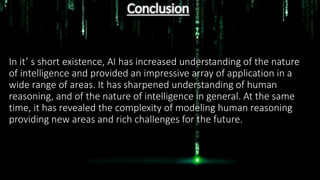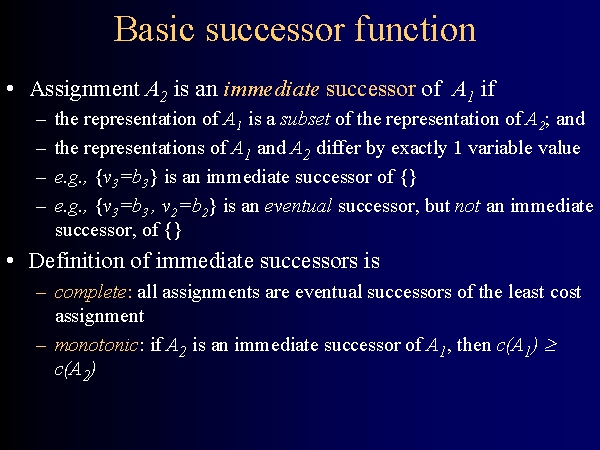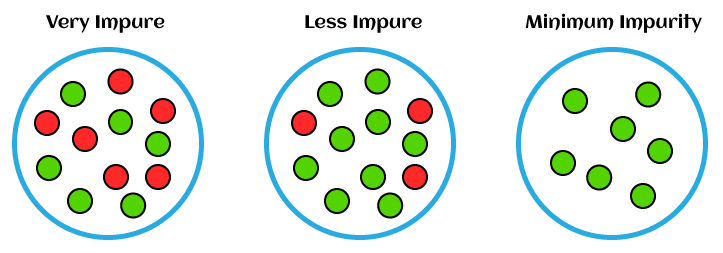Artificial Intelligence (AI) has been a topic of great interest for many years now. It is a field that has seen rapid development and growth, and has the potential to change the world as we know it. From self-driving cars to personalized recommendations on streaming platforms, AI has already made a significant impact on our lives. However, as with any new technology, there are concerns about the potential consequences of AI. One of the biggest questions being asked is, what is the conclusion of artificial intelligence?
Many experts have debated the potential outcomes of AI. Some believe that it will bring about a new era of prosperity and progress, while others fear that it may lead to the downfall of humanity. The reality is likely somewhere in between. AI has the potential to greatly benefit society, but it also poses some serious risks. As such, it is important to carefully consider the implications of AI in order to ensure that it is used in a responsible and ethical manner. In this article, we will explore the various potential outcomes of AI and discuss what the future may hold for this exciting and rapidly evolving field.

What is Artificial Intelligence?
Artificial Intelligence (AI) is an area of computer science that focuses on creating intelligent machines that can think and act like humans. AI is a broad field, and it has applications in almost every industry, from healthcare to finance.AI is a term used to describe machines or programs that can think and act like humans. These machines or programs use algorithms to make decisions and are programmed to learn from their experiences. AI has the potential to solve complex problems, automate tasks, and make decisions faster and more accurately than humans.
Applications of Artificial Intelligence
AI is being used in many different industries to improve efficiency, accuracy, and safety. AI is being used in healthcare to diagnose diseases, in finance to detect fraud, and in manufacturing to automate production. AI is also being used in robotics, natural language processing, and computer vision. AI can help to reduce costs and increase productivity in many industries.
AI for Healthcare
AI is being used in healthcare to diagnose diseases, monitor patient health, and provide personalized treatments. AI can analyze large amounts of data to identify patterns and detect diseases earlier. AI can also be used to monitor patient health and provide personalized treatments. AI can also help to automate administrative tasks, reduce paperwork, and improve patient care.
AI can be used to diagnose diseases more accurately and quickly than humans. AI can also help to reduce medical errors, improve patient safety, and reduce costs. AI is also being used to develop new treatments and medicines, and to improve the accuracy of diagnosis and patient care.
AI for Manufacturing
AI is being used in manufacturing to automate production, improve quality control, and reduce costs. AI can be used to monitor production processes, detect defects, and optimize production. AI can also be used to improve efficiency and reduce costs. AI can help to reduce waste and improve the accuracy of production.
AI can also be used to improve the quality of products and reduce defects. AI can be used to detect defects in production processes, optimize production processes, and improve the quality of the final product. AI can also be used to reduce downtime and increase productivity.
AI for Finance
AI is being used in finance to detect fraud, improve customer service, and automate financial operations. AI can be used to detect suspicious activity and identify fraudulent transactions. AI can also be used to improve customer service by providing personalized advice and recommendations. AI can also be used to automate financial operations and reduce costs.
AI can also be used to improve the accuracy of financial forecasting and decision-making. AI can be used to analyze large amounts of data to identify patterns and trends that can be used to make better decisions. AI can also be used to improve the accuracy of financial models and reduce the risk of financial losses.
Conclusion
AI is an emerging technology with many applications in different industries. AI can be used to automate tasks, reduce costs, and improve efficiency. AI can also be used to diagnose diseases, detect fraud, and improve customer service. AI is an important technology that has the potential to revolutionize many industries.
AI can be used to solve complex problems, automate tasks, and make decisions faster and more accurately than humans. AI has the potential to improve many industries and the lives of people around the world. AI is an exciting technology that is sure to have a major impact on society in the near future.
Frequently Asked Questions About Artificial Intelligence
Artificial Intelligence (AI) is the science of building machines that can think, learn, and act like humans. AI can be used to automate tasks, make predictions, and solve problems in a variety of fields.
What Is the Conclusion of Artificial Intelligence?
The conclusion of Artificial Intelligence is that AI is a rapidly growing field of research that is making a significant impact in areas such as healthcare, transportation, finance, and robotics. AI can be used to automate tasks, make predictions, and solve problems in a variety of fields. AI-based solutions are becoming increasingly popular in many industries due to their ability to improve accuracy, speed, and scalability.
AI is a tool that can be used to augment human capabilities, but it is important to remember that AI is not a replacement for human intelligence. AI is a powerful tool, but humans are still essential for making decisions and executing tasks. AI can augment human capabilities, but it cannot replace them.
Artificial Intelligence Part – 4 The Conclusion
In conclusion, the field of artificial intelligence continues to evolve and expand at a rapid pace. While there are concerns about the potential negative impacts of AI, such as job displacement and loss of privacy, there are also many exciting possibilities for improving our lives and solving complex problems. As researchers and developers continue to push the boundaries of what is possible with AI, it will be important to carefully consider the ethical implications of these technologies and work towards creating a future where AI serves to benefit humanity.
Ultimately, the conclusion of artificial intelligence is that it is a tool, and like any tool, it can be used for good or for harm. As we move forward into a world increasingly shaped by AI, it will be up to us to steer its development and ensure that it is used responsibly and for the betterment of society. By embracing the potential of AI while also remaining vigilant about its potential risks, we can create a future where technology and humanity work hand in hand to create a better world.



